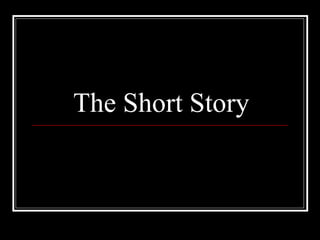
Elements of fiction
- 2. Short Story vs Novel Meant to be read in one sitting Tend to be less complex Usually focus on one incident Fewer characters Tend to follow similar pattern
- 3. The Pattern
- 4. The Pattern Where does this come from? Aristotle’s Poetics
- 5. The Pattern Plot is “the first principle” Consists of Exposition Incentive moment or “inciting incident” Rising action Crisis Climax Denouement
- 6. The Pattern Exposition: does not further plot but is essential information for reader Inciting incident: starts cause and effect chain Rising action: continues cause and effect chain Climax: elements of story should have inevitably led here. Resolution and denouement: caused by preceding events, but don’t lead to outside incidents
- 7. The Pattern Must be “unified” No deus ex machina Aristotle didn’t like episodic plots
- 8. Some more Greek terms A complex plot is better because they have: Peripeteia: reversal of fortune Anagnorisis: turn upon surprise--change from ignorance or knowledge. This leads to Catastrophe Catharsis
- 9. The other “principles” Character Diction Theme Melody Spectacle
- 10. Conflict Person vs person Person vs society Person vs self Person vs nature Person vs fate (God)
- 11. Character Protagonist vs hero Dynamic Static Flat Round Foil
- 12. Theme Statement General but not too general Should account for all major details Avoid sweeping generalizations. No clichés Helpful to mention topic title and author in a theme statement
- 13. Narrative Point of View
- 14. First Person Advantages Disadvantages o reader more involved o Only see through eyes o narrator as character of one character =more complex story o Trust? o What are we not seeing?
- 15. Third Person Advantages Disadvantages o Fly on wall perspective o Sometimes author o Understand intentionally limits our perspectives of view for specific multiple characters purpose o No judgment o Distancing o May appear to not have bias
- 16. (Intrusive Narrator) An omniscient narrator who, in addition to reporting events of story: Offers further comments Sometimes reflects generally upon significance of story. Common with 19th century novelists.
Notas del editor
- This year we are going to look at literary criticism and the different ways in which people interpret what they read. We do this for a number of reasons, but mostly to try to reach an understanding of how literature reveals certain truths about ourselves. So we will start with the ancient greeks and what they have to say about “story” Three components of plot are beinning, middle and end.
- When Aristotle wrote about story, he was writing about the theatre in ancient Greece because that was the “story of the time: Comedy vs tragedy.
- Inciting incident: effects are more important than the cause but should not depend on anything outside the story
- Self-contained. All the elements were already there in one form another. Not an “And then I realized it was all a dream” story. Episodic plots: one event does not necessarily lead to the next. Just a string of events. Think of a sit com. Vs something like Lost.
- Writing about tragedy. In theatre.. But it ’s the bases for lit criticism. Catharsis: why do we like to read about suffering? Because we identify and then recognize it’s not use which is a relief.
- For our purposes, these other principles are not quite as important.
- All stories require some form of conflict
- Protagonist is the person with whom you identify in the story. He or she may or may not have heroic qualities. Dynamic: changes over course of story (scrooge) Static: Stays the same Events don ’t change them. Flat: reveals only one or two character traits. Can include stock characters Round: Also may be called “fully developed” character. Exhibits many and sometimes contradictory traits. Usually also dynamic. Foil: purpose is to enhance another character through contrast. Holmes and Watson
- Appearance vs reality is a topic not a theme. The theme is the author ’s idea about a topic. Generalization about life not individual characters, but not so general that it lacks a point. E.g., The effects of risk-taking are positive or negative is too broad. When an individual takes a calculated risk, he or she experiences excitement and grows as an individual.” Better. Sweeping generalizations “all, every, always,”